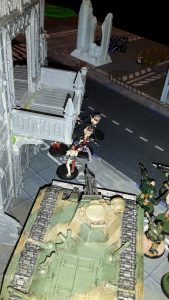40K: Campaigning For Glory



A guest writer is here to share some his experience and some tips on running a successful 40K campaign.
Hi everyone, FLG writer Michael Corr here to talk to you about the benefits of running a 40k campaign at your local gaming club and to offer some advice to budding campaign organisers based on my own experiences.
For more reviews, analyses and battle reports, check out the Tactics Corner.
First off, a little bit of my campaign history for 40k. I have been running 40k campaigns for many years now at local gaming clubs. My very first one was the Vogen Cityfight campaign, the rules for which were published in White Dwarf. This was an awesome campaign with very simple rules that gave my Orks a chance to rampage though the city streets (and required me to build and paint of 30+ foamboard city ruins for the campaign). This was a nice, easy campaign to get started with as the rules were already provided and simply required me to recruit players and organise games.
My most recent campaign has just come to a close. My map-based 40k campaign involved 18 players (15 initially, with more added as we went on), ran for 11 months and featured over 130 battles for control of the Kharysian sector of an Astra Militarum world. This was by far the longest and biggest campaign that I have ever run and I think it was generally well received by the players at the club. For anyone interested in reading the rules for the campaign or seeing how it progressed over the course of the year, you can find it on my blog. This article is going to discuss some of my experiences over the course of campaign and some advice for budding campaign masters.
Why run a campaign?
The simplest answer is: you want to play some games of 40k!
The reason that I started my last campaign was to get to know people at my local gaming club. I had started attending the Dundee Wargames Club about 4 months before I decided to start the Medusa IV campaign. I had gotten to know a few people that I have played over the previous months, but there were still a whole lot of 40k players at the club that I had yet to meet or play. Running a campaign gave me a way to interact with a lot of the gamers at the club and to play a variety of different opponents that I may not have been able to play. It was a great way to introduce myself to the members of the club and to get my name and face known there.
Running a campaign can be a great way to get to know players at a local gaming club or a great way to start a new gaming club in your area. Obviously, when to start organising a new campaign will differ for each player and each club. I doubt I would have had much success if I turned up to my first night at the club and announced that I was going to organise a new 40k campaign.
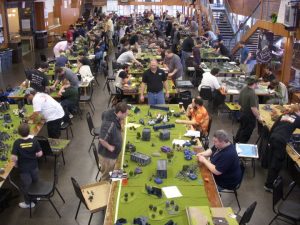
Keep it Simple!
I would recommend keeping the rules of your campaign simple, especially if it is the first campaign that you are going to run.
I have frequently had visions of massive map-based campaign systems featuring different sized armies manoeuvring around the board, backed up by supply lines and air drops, with small outflanking and guerrilla forces launching ambushes on marching columns, but a more complex campaign doesn’t necessarily make a better campaign.
40k is a complicated enough game as it is, adding a whole bunch of additional rules just to fight games may put off a lot of players or players in the campaign may simply ignore many of the new rules.
My own campaign was quite simple. Players simply picked a tile on the map, fought a battle and if they won, rolled to see if they captured the tile. There were additional rules for gaining resource points and constructing buildings to give you a bonus in some games, but these were optional and players could go through the entire campaign without using them if they wanted. Even if they did choose to use them, they were simple enough to pick up quite easily and didn’t get in the way of games.
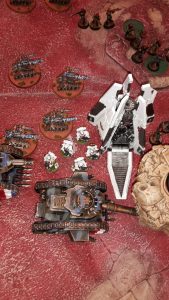
Remember, the campaign is there to encourage you to play more games of 40k, not to restrict the number of games that people can play. If you ever find yourself saying “sorry, you can’t play a game this week”, I suggest you re-think the rules of the campaign.
I would also advise against having too many army choice restrictions in play. People want to play with the models that they have lovingly constructed and painted and might not like being told that they are not allowed to take them. Our campaign allowed 30k armies and Superheavy vehicles. I find that players organising a game at their club will generally impose their own restrictions on a game in terms of army selection without the campaign organiser needing to get involved. Of course, if one player’s Imperial Knight army is steamrolling all the other armies you could always “encourage” them not to use it in a few games (it could be out of fuel until he captures that nearby promethium refinery).
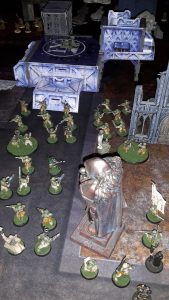
Getting Organised
This was my first campaign that I ever organised using Facebook and it was a life saver!
Previously all my campaigns were arranged through emails and it could get pretty complex searching through all my old emails to see what moves people wanted to make, who was playing who, etc.
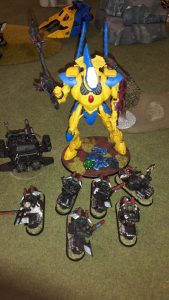
For the Medusa IV campaign, I made a closed Facebook group for players to join. This allowed me to post the updated campaign maps, let players know what games they had to play that campaign turn and share any battle reports or photos from players in the campaign. It also allowed players to organise when to play games and engage in trash talk with their opponents before a game or gloat about their glorious victory after the game.
Encouraging these grudge matches and narrative play can be a great way to get players more invested in their games and the campaign.
If you are planning on running a campaign, I would strongly recommend using something like a Facebook group (or a forum page if you are all members) to organise and run the campaign, as it makes things much easier.
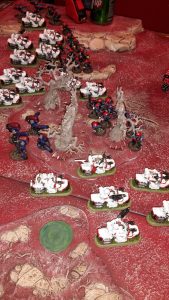
Having Contingencies
I was blown away by the number of players that signed up to fight in my last campaign. Fifteen players was about three times the number of players that I had previously had for any other campaign. I decided to organise different campaign alliances made up of 2-4 players with the same army or forces likely to fight together.
This enabled players in an alliance to fight any battle for another player in the same alliance. This is important for when life gets in the way of 40k (don’t you just hate it when this happens?). Emergency cancellations, flat tires, national sporting events- all these things conspire to get in the way of your carefully crafted campaign and it helps to not have campaigns derailed simply because one player cannot show up for their game.

Obviously it will depend on how many players you have in a campaign as to whether you can set up different alliances or sides in a campaign, but I would recommend doing this if you can. This stops the campaign from being put on hold when players are on holiday or on the basis that some players cannot attend a gaming club every week.
In my own campaign, if a tile was unoccupied, players were allowed to fight anyone to try and claim it, not just people in the campaign. This represented a set of scouting forces meeting one another and having a battle. This allowed others to get involved in the campaign, even if they could not commit to taking part on a regular basis.
Make sure that each campaign turn or round gives players sufficient time to get their games arranged and played. As I have mentioned above, not every player can attend a gaming club every week. My own campaign turns usually lasted about 4 weeks. This should have hopefully provided players to get at least a game or two in each campaign turn without them feeling like they were getting left behind.
Pester, Pester, Pester
One thing I have noticed is that as campaign master, you will generally need to be a pest to the players in the campaign, constantly bombarding them with emails or messages along the lines of: “please remember to send me the moves for this turn”, “please remember to send my your results for this turn”, “please give me a sign of life so I know I am not just shouting into the void. Please? Anyone?”.
Many players will need frequent reminders over the course of the campaign to get their moves or results back to you. This is fine, many people have busy lives taken up by friends and family and other hobbies (or so I have been told). Again, I find that Facebook is great for this, allowing you to tag specific players if you need their campaign moves or results.
When you are requiring feedback from players, remember to give them a decent amount of time to get back to you. I would generally post the results of the campaign games on the Friday morning (after the club night on a Thursday). The players’ next moves were to be decided by the following Tuesday evening, giving even the slowest of players over 4 days to get back to me. If I hadn’t hear from them by the Tuesday morning, a gentle reminder on the campaign Facebook page was generally sufficient for them to get their move in to me.
On the other side, it is important to be strict with your deadlines. Having players trying to make moves for the last campaign turn or fight battles from the last campaign turn can make things quite complex for the organiser and lead to confusion with other players.
Bringing in Fresh Meat
Don’t be too afraid to allow new players to join in to the campaign. The longer a campaign is running, the more chance there is that players will have to drop out due to other commitments. It helps to be able to bring in new players to keep a campaign going or to welcome new players to the club.
It may help to have rules to help new players from being steamrolled by those who have been in the campaign for a long time. For example, in my own campaign, players get a 50 pts bonus to their army for each tile that their opponent outnumbers them by (i.e. a player with 8 tiles fights a player with 4 tiles. The player with 4 tiles gets an extra 200 pts for their army).
Know When to Stop
It may help to have a fixed end point for when your campaign will finish. A 40k campaign that runs on indefinitely has more change of petering out as time goes on as players continue to drop out or move on to new games. Maybe you could finish the campaign off with a bang by hosting an event such as an Apocalypse or multi-player game
How long your campaign will run for will depend on how much enthusiasm your players have for it and how keen they are to keep it going. I had no set date to finish when I started my campaign. I didn’t think it would last as long as it did, but I kept it going as long as people were interested in playing. After losing about 6 players over 2 campaign turns, I decided it was time to wrap it while players were still enjoying it, rather than have it steadily decline until only one or two players were left.
It can also be nice to take periodic breaks in the campaign for a few weeks. This gives players a chance to play other game systems that they collect and stop the feeling that they have to play 40k each week.
General Advice
Here are some more general tips for running a campaign:
- Make it impossible for players to be eliminated for the first few turns of the campaign. There is nothing that will demoralise a player more than getting worked up to take part in the campaign and then getting knocked out in the first round.
- Have some fun with it. I gave each player a list of secret objectives to complete in order to gain big bonuses to their armies. It forced them to try and fight all the different alliances on the map and play a variety of opponents. It could be something simple, like the first player to destroy 10 tanks gets a bonus tile or bonus building.
- If you are using a map based campaign system, allow players to attack anywhere on the map. If they can only attack adjacent tiles/locations, they may get stuck fighting the same players over and over.
- Have a go yourself. Get involved and fight some battles in your campaign. You went to all this effort, why not enjoy it.
So have a go at running a 40k campaign. It could help re-energise your local gaming group or just give you a reason to play more games. For those of you interested in running a campaign, but don’t want to come up with your own rules, you can check out the rules for my campaign and see if they suit you (the empty map for the campaign is even provided for you to use).
Have you ever run your own 40k campaign? Any advice to offer to others out there on making it a success?
And as always, Frontline Gaming sells Games Workshop product at up to 25% off of retail, every day!
You can also pick up some cheap models in our Second Hand Shop. Some of these gems are quite rare, sometimes they’re fully painted!

